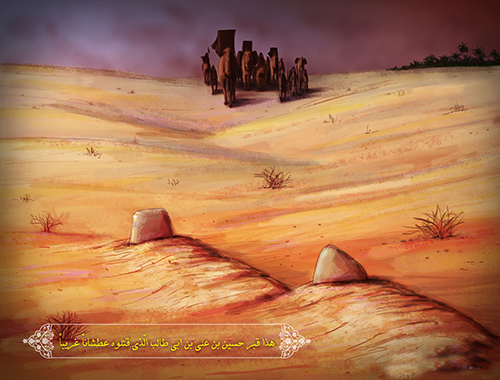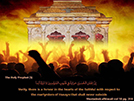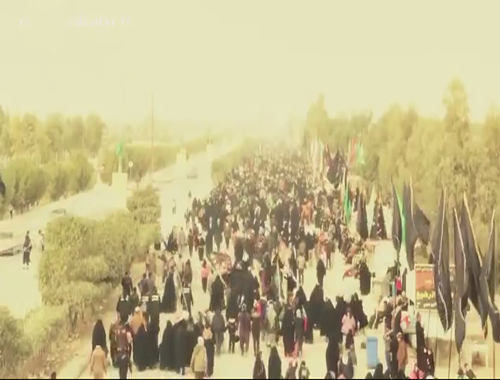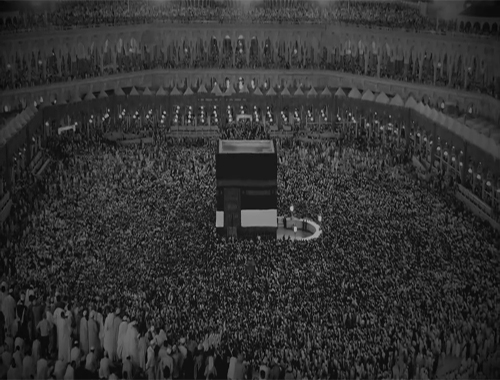Some other degrees of sincerity
- Details
- Hits: 4432
Some other degrees of sincerity
--------------------------------------------------------------------------------
Now as the String of the Speech Has Reached this Point, I Have But to State Some Other Stages of Sincerity Befitting this State
One of the stages of sincerity is to purge the act from thinking of deserving a reward. The counterfeit of it is the act blemished with demanding the expected reward. This is not free from a degree of admiring the act, and the salik is to rid himself of it. Assuming deserving reward is caused by the deficiency in one's knowledge of his condition and of the right of Allah, the Exalted. This is also a fruit of the Satanic evil tree, stemming from being proud of oneself, one's act, I-ness and selfishness. How hopeless man is! As long as he is wrapped in the veils of being proud of his acts, believing them to be of his own, and regarding himself the manager of the affairs, he will not be cured from this disease, and will not be able to purge his act and purify his intention. Therefore, the salik is to strive to inform his heart, through cordial austerity and mental and gnostic conduct, that all acts are of Allah's blessings and gifts which He carries out by the hand of His servant. Should the Unity of Acts get fixed in the heart of the salik, he would not regard his acts as to be of himself, therefore he would not demand any reward, and, actually, he would regard the reward to be favour and the blessings to be new beginnings.
This divine delicacy is frequently stated in the words of the pure Imams (AS), especially in As-Sahifatus-Sajjadiyah [a book of invocations and supplications by Imam 'Ali ibn-Husayn, as-Sajjad], a divine and luminous book, which has descended from the gnostic heaven of the knower of Allah, the luminous intellect, Sayyidus-Sajidin [the master of the prostrate worshippers], for the sake of the salvation of the servants of Allah from the prison of nature, demonstrating the discipline of servitude and of being at the service of the Lord. In the thirty-second invocation he says: " ... so praise be to You for Your beginning with great favours, and for Your inspiring gratitude for [Your] benevolence." [263]
He also says, on another occasion:"... since all Your benevolence is favour and every one of Your blessings is a new beginning." [264]
In Misbahush-Shari`ah it is said: " The least limit of sincerity is the servant's doing all his best, then he should not attach to his act [of worship] any value with Allah, by which he would impose on his Lord [to give him] a reward for his act." [265]
Another stage of sincerity is to purge the act from demanding much and being pleased with it and depending on it. This is also one of the important tasks of the salik, lest he should be retained back from joining the caravan of the travelers to Allah, confining himself to the dark dungeon of nature. This is a situation stemming from the vile Satanic tree, and from the selfishness inherited from the legacy of Satan who has said: "You created me of fire and created him of clay." [266] This is but man's ignorance of his own state [maqam] and of the state [maqam] of Allah, the Glorified.
If this wretched "possible [existent]" could only recognize his own state of deficiency, incapability, weakness and helplessness, and realize Allah's state of greatness, grandeur and perfection, he would never boast of his act and of performing an act. Wretched! His act [of worship], which would be worth only a few pence for a whole year, should it prove to be complete and correct, he would ask; for only two of its rak`ats, unlimited expectations. It is this expectation and much-demanding that originate many immoralities and other acts of mischief, which cannot be mentioned here for fear of becoming lengthy.
The noble hadiths frequently refer to this subject, as is in noble al-Kafi, quoting Imam Musa ibn Ja'far (AS) to have said to some of his sons : "My son, you are to be diligent, never to clear yourself from falling short of fully worshipping and obeying Allah, the Most High, for He can never be worshipped as He deserves." [267]
In another hadith, he (AS) said: "Any act you do for Allah, take yourself as to be falling short of it, since all the people, in their acts, between themselves and Allah, are derelict [muqassir], except the one whom Allah, the Exalted, protects against that." [268]
He (AS) is also quoted to have said: "Do not consider plenty the plenty good deeds." [269]
The complete Sahifah, describing the angels, says:" Those who, looking at Hell breathe out to the people of disobedience, say" `Glory to you, O Allah, we have not worshipped You as You deserve to be worshipped. " [270]
O You helpless! When the Messenger of Allah (SA), who was the most knowledgeable among Allah's creatures, and whose act [of worship] was the most luminous and the greatest of all others', admitted his shortcoming and inability, and who says: "We have not known You as You ought to be, and we have not worshipped You as You deserve it," [271] and when the infallible Imams (AS), in the Presence of His Sanctity, display their shortcomings and deficiencies, what can a tiny gnat do? [272] Yes, their status and knowledge urged them to admit the incapability of "the possible existent" and the Greatness and Glory of the "Necessary Existent", Allah, the Exalted, whereas we, the helpless, because of ignorance and diverse veils, arrogantly show off our ostentation and pride in our acts. Glory be to Allah! How right Amirul Mu'minin 'Ali (AS) was when he said: "Man's self-admiration is one of the enviers of his intellect." [273] Is it not irrational that Satan should make obscure for us a necessary matter, and we should not try to intellectually reason it? We ourselves, know, of necessity, that our acts [of worship] and the acts of mankind as a whole, as well as the acts of the angels of Allah, and the spiritual people, cannot be compared with the acts of the Messenger of Allah (SA) and the Imams of guidance (AS), as ours can have no value whatsoever, and cannot be of any regard at all. Yet, those great ones confess their shortcomings and do not conceal their incapability of performing the worship due to Allah, the Exalted, according to so many successive hadiths. These two necessary cases give us to conclude that we should not be pleased with any of our acts. Or even if we spend as long as the life of the world in worshipping and in acts of obedience, we should still be ashamed, abashed and disgraced. Nevertheless, Satan has so deeply established himself in our hearts, and so strongly has his control over our minds and senses, that the states [ahwal] of our hearts have been changed to the contrary, let alone our failure in deriving the necessary conclusions from those preliminaries.
The great man ['Ali ibn Abi Talib], whose strike on the Day of the Trench [274] was more merited than the worship of all jinn and ins [mankind], according to the confirmation of the Messenger of Allah (SA) - and 'Ali ibn al-Husayn, with all his worships and austerities, though known to be the greatest worshipper of all Allah's creatures, shows his inability to attain to his state of worshipping- [274a] declares his shortcoming in this respect more than we do. The Messenger of Allah (SA)-at whose threshold 'Ali al-Murtada and all, other than Allah, are servants and live on the crumblings of his blessed table of knowledge and are the students of his teachings-after receiving the cloak of honour of the Final Prophethood, the complete circulation of perfection and the last brick of knowledge and tauhid, continued, for ten years, to stand on his feet in Hira cave, performing his worshippings in obedience to Allah, until his feet swelled such that Allah revealed: "TA HA, We have not sent down the Qur'an upon you that you should be distressed." [275] i.e.: "O `pure' and `guide'! We did not reveal the Qur'an to you to cause you difficulty. You are pure and you guide the people, and if they disobey you, it is because of their own shortcoming and misfortune, not because of any shortcoming in your conduct or guidance". Nevertheless, he still announces his inability and falling short.
Sayyid Ibn Tawus [may his soul be sanctified] quotes from 'Ali ibn al-Husayn (AS) a hadith which we shall relate to honour our thesis and, although it is a bit lengthy, since it is an explanation of the position of that master, yet the smelling sense of the souls will be scented by it and the palate of the hearts will take a delight in it.
He [may his soul be sanctified], quoting az-Zahri, in Fathul Abwab , says: "I, together with 'Ali ibn al-Husayn (AS), called upon 'Abdul Malik ibn Marwan. 'Abdul Malik, regarding it as magnificent to see the mark of prostration between the two eyes of 'Ali ibn al-Husayn (AS), said: `O Abu Muhammad, perseverance is obvious on your face, and Allah has already been beneficent to you, as you are a part of the Messenger of Allah (SA), a close relative with a firm relation to him, and you have a great favour upon your family and your contemporaries. You have been given such merits, knowledge, godliness and piety that have been given to no one like you or before you, except your past ancestors.' He continued praising and extolling him. 'Ali ibn al-Husayn (AS) said: `All that which you have described is of Allah's favour , support and grace. But how is [my] thanking Him on what He has favoured [me], O Amirul Mu'minin? The Messenger of Allah (SA) used to stand in his salat on his feet till they got swollen, and he remained thirsty during his fasting such that his mouth would dry up. He was asked: `O Messenger of Allah! `Did not Allah forgive what has passed and what is to come of your sins?' He replied: `Am I not to be a thankful servant?' Praise be to Allah for what He has favoured us with and for His testing us, and praise be to Him in the Hereafter and in this world. By Allah, even if my limbs were cut to pieces and my eyeballs ran down my chest just to pay tribute to Allah, the Most Glorified, for just a tenth of one tenth of a single one of all His favours, which no reckoner can reckon, nor the praise of the praisers can pay the tribute due to a single one of them, I could not pay the due tribute to Him. Never, by Allah, unless He grants me that nothing should keep me from praising and remembering Him all days and nights, secretly and publicly. Had I not been under obligations to my family and to other people, in particular and in general, who have rights against me, and which I cannot but fulfill to them as it is possible and as is in my capacity, I would have turned my eye to the heaven, and my heart to Allah, and then I would have never taken them back till He would take my breath-He is the best of judges.' Then he (AS) wept, and so did 'Abdul Malik ... " as the hadith goes. [276]
We forgo mentioning other stages of sincerity which do not suit the position of these papers, lest it should be lengthy and boring.
Notes:
[263]. As-Sahifah as-Sajjadiyah, invocation No. 32.
[264]. Ibid., invocation No. 12.
[265]. Misbahush-Shari`ah, ch. 76, on "Sincerity".
[266]. Surah al-A'raf: 12. Surah Sad: 76.
[267]. Usulul Kafi, vol. 3, p. 116, "Book of Faith and Disbelief', ch. on "Admitting Shortcomings", hadith No. 1.
[268]. Ibid., hadih No. 4.
[269]. Ibid., vol. 3, p. 394, "Book of Faith and Disbelief', ch. on "Slighting the Sin", hadith No. 2. Also vol. 4, p. 196, ch. on "Reckoning the Deeds", hadith No. 17.
[270]. As-Sahifah as-Sajjadiyyah, invocation No. 3.
[271]. Mir'atul `Uqul vol. 8, p. 146, "Book of Faith and Disbelief', ch. on "Thanking".
[272]. "Where a falcon drops its feathers, What can a tiny gnat do?" Amthal and hikam, by Dehkhuda, vol. 2, p. 579, Poet's name not mentioned.
[273]. Nahjul Balaghah, ed. by Faydul Islam, p. 1172, Maxim 203.
[274]. Biharul Anwar, vol. 39, p. 2, "Tarikh-i Amirul Mu'minin".
[274a]. Ibid., vol. 46, p. 75, "Tarikh-i 'Ali ibn al-Husayn" ch. 5, hadith 65.
[275]. Surah Ta-Ha: 1 and 2.
[276]. Biharul Anwar, vol. 46, p. 57, "Fathul Abwab".
So, what do "barriers of light" mean? Does "looking at Allah" mean looking at the palaces of Paradise? Does "the Source of Greatness" mean heavenly palaces? Does "the hanging of the souls to the Might of Sanctity" mean hanging to the skirts of the houris for sensual desires? This "being stunned because of His Majesty', does it mean being spell-bound at the beauties of the women of Paradise? Those ecstasies and faintings which used to befall the Messenger of Allah (SA) during his ascending salat , and those lights of grandeur, and the things loftier than them, which he used to discern, in that meeting in which the Archangel, Gabriel (AS), was not admitted and he dared not to advance even for an inch farther, were those ecstasies for one of the very good women? Or did he discern lights like those of the sun and the moon or much brighter? That sound heart, which was referred to by the infallible [ma'sum] (AS) in explaining the verse: "Except him who comes to Allah with a sound heart", [253] by saying: "A sound heart is that one which meets Allah while there is nothing in it save Him," [254] does it mean that "there is nothing in it save Allah" denotes "nothing save the generosity of Allah", which is to mean an allusion to "nothing save [say] pearls and apricots"?
Woe to me for letting the rein of the pen be loose and engage in ecstatic phrases. But, by the life of the beloved, no particular aim was intended by those words, except that there might be, for my brothers in faith, especially the learned, a sort of warning, so that they might not, at least, deny the states of the people of Allah, for such a denial would be the origin of every wretchedness and misfortune. We did not intend to say who Ahlullah [the people of Allah] are. Actually, our intention was that their states should not be denied. As to who the owners of those states are, Allah alone knows them, since it is a matter of which no one is informed: "The one who got an information did not come back." [255]
There is another group who do not deny the states of the people of knowledge and are not against the people of Allah. But their indulgence in worldly matters, trying to obtain them, and their taking to the transient pleasures, have prevented them from acquiring knowledge, practice, intellectual intuition [dhauq] and ecstasy [hal]. They are like those sick people who do know they are sick, but their stomach would not let them be cautious and accept taking bitter medicine, while the former group are like the patients who would never believe in the existence of such patients and such disease in actuality, and despite the fact that they themselves are afflicted with this disease, they deny its existence.
Another group took to acquiring knowledge and engaged in learning theories, but as regards the truths of knowledge and the states of the people of Allah, they satisfied themselves with terms and vocabularies, and with the gaudiness of phrases and expressions. They tied themselves and other wretched ones in the chains of words and terms, and out of all "states", they satisfied themselves with mere talk. Among them there are a few who do know themselves, but, in order to preside over some other unfortunate persons, they use these meaningless terms as a means of winning a living, and, with their deceitful expressions and attractive talks, they capture the pure hearts of the servants of Allah. These are the human Satans whose harm is no less than that of the accursed Iblis himself against the servants of Allah. These unfortunate ones do not know that the hearts of the servants of Allah are the abode of Allah, and no one has the right to occupy them. They are usurpers of Allah's abode and destroyers of the real ka`bah. They carve out idols and place them in the hearts of the servants of Allah, which are the ka`bah, or rather al-Baytul Ma`mur [Allah's Populous House]. They are the sick people who pretend to be physicians, and involve the servants of Allah in diverse deadly diseases.
The members of this group are distinguished for being more interested in guiding the wealthy people and the notable personalities than in guiding the poor and the indigent, and their followers are more of the well-off and notable people. Even they themselves appear in the apparel of the wealthy people. They play on such deceptive talks that while they are polluted with a thousand kinds of mundane impurities, they can show themselves as purifiers and of the people of Allah. The wretched fools and their followers close their eyes against all their tangible faults, and flatter themselves with empty terms and utterances.
Now as we have reached this stage of our speech, it is worthwhile to relate one or two hadiths narrated in this respect, although it would be out of the content of our discourse. However, getting the blessings of the hadiths of Ahlul Bayt (AS) is a good thing:
Shaykh as-Saduq [may Allah have mercy upon him] in his book al khisal, quoting Abu `Abdullah [as-Sadiq] (AS), says: "There are among the scholars those who like to compile their knowledge, and do not like to be quoted. These are at the first step of the Fire. Other scholars are proud when they admonish, but they disdain being admonished. These are at the second step of the Fire. Some scholars prefer to put their knowledge at the disposal of the noble and the wealthy, excluding the poor from it. These are at the third step of the Fire. Other scholars behave like the tyrants and the monarchs in their knowledge, and if they were redressed or neglected in some of their affairs, they would become angry. These are at the fourth step of the Fire. Some scholars look for the hadiths of the Jews and the Christians in order to support their own knowledge and increase their own hadiths. These are at the fifth step of the Fire. Other scholars appoint themselves to give out religious decrees, telling the people: "Ask me!", whereas they may not be right even in a single letter, and Allah does not like the pretentious. These are at the sixth step of the Fire. There are among the scholars those who take knowledge to be a sense of honour and intellect. These are at the seventh step of the Fire." [256]
Al-Kulayni [may Allah have mercy upon him], in his comprehensive [book] al-Kafi , quoting Imam al-Baqir (AS) , says : "The one who seeks knowledge in order to vie with the scholars, or to argue with the fool, or to attract the people to himself, let him have his seat in the Fire-Presidency does not befit except its deserver." [257]
Also quoting Imam as-Sadiq (AS) he says : " Whenever you see a scholar loving this world accuse him of being against your religion, as the lover of a thing seeks to get what he loves. And he said: "Allah, the Exalted, revealed to David (AS): `Do not place between Me and yourself a scholar who is infatuated with this world, as he would prevent you from the way of My love, for those are the robbers of My loving servants. The least I would do to them is to extract the sweetness of supplication to Me from their hearts." [258]
Those from among this group, who are not impostors or fraudulent, and are themselves saliks on the road to the Hereafter , striving to acquire knowledge and high states, it sometimes happens that they are fooled by Satan, the highway robber , and get conceited , thinking that the states and knowledge [ma`arif] are really nothing but the very scholarly terms and expressions which they themselves or others, have coined. They spend the prime of their years and the best of their lives, in multiplicating those terms and composing books and papers, such as a group of versed mufassirs [ writers of commentaries on the Qur'an ] who think that the advantage of the Qur'an is confined to recording a collection of different ways of its recitation, the meanings of its vocabularies and conjugation of its verbs, its verbal and moral beauties, aspects of its miraculous inimitability, its conventional meaning, and its different impressions on different persons, but they are completely ignorant of the Qur'an's message, its spiritual dimensions and divine knowledge [ma'arif]. They are more like a sick man who has gone to a physician and received his prescription, and thinks that he will be treated by way of recording and preserving the recipe and by the mode of its ingredients. This disease will kill such people, for knowing the recipe and going to the doctor come to no avail at all.
O dear! All sciences are practical. Even the science of tauhid [monotheism] also consists of cordial and formal acts. Tauhid, grammatically, denotes turning plurality into singleness - a spiritual and cordial act. Unless you recognize the real and the true cause in the multiplicity of acts, unless you have a truth-finding eye to discern Allah in nature, unless you regard the natural and non-natural multiplicities as perished [fani] in Allah and His acts, and unless the authority of Allah's Unity of Acts has not spread its banner in your heart, you will be far away from purity, sincerity, clearness and purification, as well as from tauhid. All of the hypocrisy of acts and most of the cordial hypocrisies, are caused by the incompleteness of the unity of acts. The one who regards the weak and unfortunate people to be effective in this world, and occupying the domain of Allah, how can he regard himself in no need of attracting their hearts, and purge and purify his act from Satan's polytheism? You will have to make the spring clean so that clear water may come out of it, as otherwise, from a muddy spring you may not expect to get clear water. If you regard the hearts of Allah's servants to be at the disposal of Allah, and make your heart taste the meaning of: "O You Who change the hearts", and let your heart hear it, you, with all your weakness and helplessness, will not try to capture the hearts. If you made your heart understand the truth of " ... In His hand is the dominion of everything," [259] "His is the [whole] dominion" [260] and "In His hand is the dominion," [261] you will need not attract any hearts, nor think that you are in need of the weak hearts and the weak people, and you will attain to a state of cordial satisfaction. You felt yourself being in need of something, and took the people to be undoers of knotty problems, and thus you thought you needed to attract the hearts of the people, thinking that by pretending holiness, you would have at your disposal the hearts of the people. Hence, you needed to be a hypocrite. Had you taken Allah to be the solver of all difficulties, and that you do not have the universe at your disposal, you would not have needed those acts of polytheism.
O you, the polytheist who claim to be a monotheist! O you, an Iblis [a devil] appearing in the shape of a human being! You have inherited this legacy from the accursed Satan, who, thinking himself effective, calls out: "I'll lead them astray." [262] That wretched, miserable being is wrapped in veils of polytheism and self-conceit. Those who believe themselves and the world to be independent and not under management, neither controlled nor owned, have inherited that from Iblis's mischief. So, wake up from [your] deep sleep and convey to your heart the noble ayahs of the Divine Book, the Lord's Luminous Page. These great ayahs have been sent down for me and you to wake up, yet, we confine all our shares to reciting it in formal artistic intonation, disregarding its informative knowledge, until Satan overcomes and rules us such that we become under his control.
For the time being, we end the discourse here, leaving it for a later time. We shall, insha'allah, talk about the disciplines of recitation, opening the way for ourselves and for the servants of Allah to be benefited by the Glorious Qur'an, with Allah's permission and His good help. Was-salam [And that is an end to the matter].
Notes:
[250]. Surah Qasas: 56.
[251]. Surah Fatir: 22.
[252]. Surah an-Nur: 40.
[252a]. Refer to footnote No. 5.
[253]. Surah ash-Shu'ara': 89.
[254]. 'Usulul Kafi, vol. 3, p. 26, "Book of Faith and Disbelief', ch. on "Sincerity, hadith No. 5.
[255]. "Those who claim to be in quest of it are uninformed" "The one who got an information did not come back." (by Sa'di)
[256]. Al-Khisal , vol. 2, p. 352, ch. 7, hadith 33.
[257]. Usulul Kafi, vol. 1, p. 59, "Book of the Merit of Knowledge", ch. on "The One Who Gains His Living from His Knowledge", hadith No. 6.
[258]. Ibid., hadith No. 4.
[259]. Surah Ya-Sin: 83.
[260]. Surah al-Fatir: 13.
[261]. Surah al-Mulk: 1.
[262]. Surah Sad: 82.











